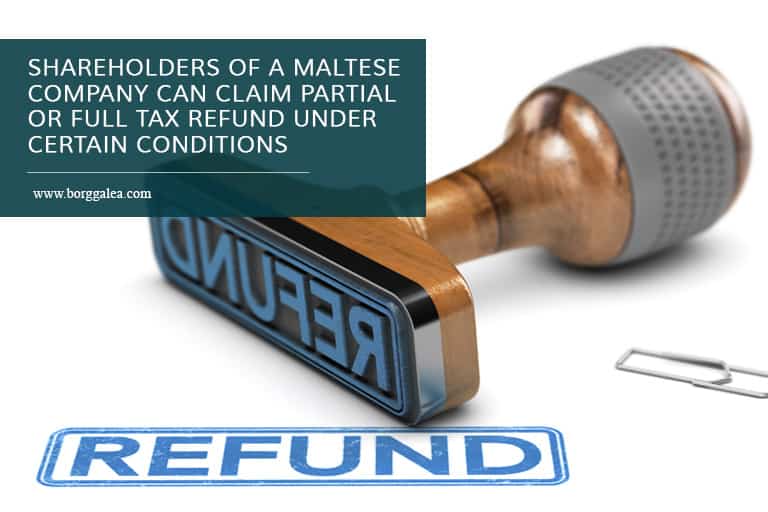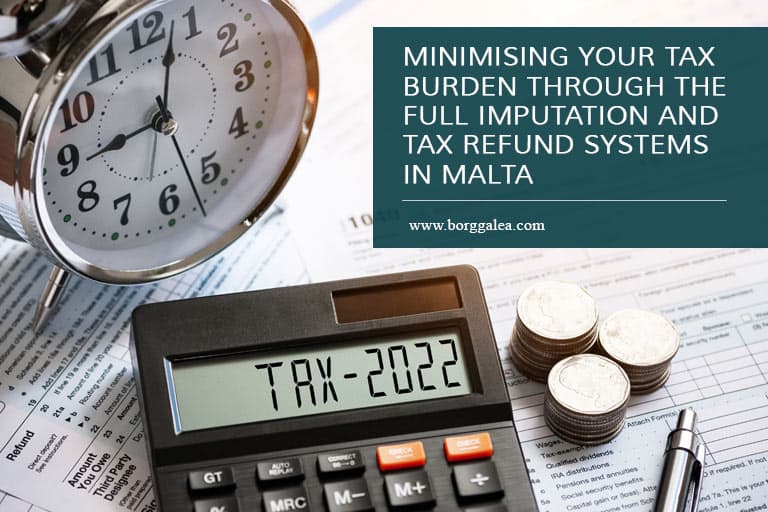An Overview of Malta

Situated as it is, in the middle of the Mediterranean, Malta is not only a popular tourist destination but also offers various investment opportunities. The island is an economic and logistical hub with a strategic location having close ties to Europe, Northern Africa, and the Middle East. It has a flexible and thriving economy with an excellent infrastructure. It is an established international financial centre and an EU jurisdiction with favourable tax rates. All of these make Malta an ideal place to invest in for various kinds of business ranging from the knowledge-based to the high-end manufacturing sectors.
Taxation in Malta
Upon satisfying certain conditions, the overall tax burden in Malta can be reduced to between 0% and 10%. This can be done through the application of a full imputation system of taxation as well as its system of tax refunds.
Companies incorporated in Malta and/or whose key management and commercial decisions necessary for conducting the entity’s business are, in substance, being made in Malta are subject to a tax rate of 35% on their taxable profits. These taxable profits are then refunded back to the shareholders upon distribution of dividends, unless the company enacts a fiscal unit which allows it to pay immediately the effective tax rate ranging between 0% to 10%, with the majority of the businesses end up having an effective tax rate of 5%. Profits so taxed, become distributable, and are required to be allocated, depending on the nature and source of the said profits, to the following five tax accounts:
- Final Tax Account (FTA) – This account shall include all distributable profits that have been subjected to tax, including income taxed under the investment income provisions, profits arising from the sale of immovable property in Malta (which have been taxed at the final withholding tax rate of 8%), and other profits the tax on which has been relieved under various tax incentive legislation;
- Immovable Property Account (IPA) – This account shall include all distributable profits that have arisen, directly or indirectly, from immovable property situated in Malta, and which is not subject to allocation to the FTA. Profits arising from economic activities connected to immovable property situated in Malta, such as profits from rents and premiums, and the provision of accommodation are also allocated to the IPA;
- Foreign Income Account (FIA) – This account shall include taxed profits arising from royalties and similar income arising from outside Malta, and from dividends, capital gains, interest, rents and any other income arising from an investment situated outside Malta, such an investment being an overseas branch, agency or permanent establishment of a Maltese company;
- Maltese Taxed Account (MIA) – This account shall include distributable profits that have been taxed in Malta and are not subject to allocation to the FTA, IPA or FIA;
- Untaxed Account (UA) – This account shall include the difference between a company’s accounting profits and the total profits allocated to the FTA, IPA, FIA and MTA.
The tax refunds system — dealt with in more detail further below — applies only to profits allocated to the FIA and the MTA.
The Full Imputation System
Malta applies the Full Imputation System of taxation. In so doing, Malta is eliminating the economic double taxation of profits declared by companies. Through this system, it is ensured that following the settlement of the corporate tax due by the company, no further tax is charged on the profits remaining after tax and profits are distributed to its shareholders in the form of dividends.
This so happens because even though dividends are subject to tax in the hand of the shareholder upon distribution, the shareholders in receipt of such dividends are entitled to receive an imputation credit for the tax paid by the dividend distributing company, thereby cancelling out the tax liability of the shareholder.
This system applies also where the recipients of the dividend are individuals, and their income is less than €19,500, excluding dividends received from a company registered in Malta, whereby they may only declare that amount of dividend which, when added up with their other chargeable income, will not exceed a total of €19,500.
However, this system shall only apply in respect of dividends distributed by a company out of profits that have been subjected to the standard rate of corporate tax of 35% and allocated to its Immovable Property Account, Foreign Income Account, and Maltese Taxed Account.
The Tax Refund System

When a Maltese company distributes a dividend to its shareholders out of the profits allocated to its MTA or FIA, the shareholders in receipt of such dividends shall become entitled to claim a full or partial refund of the Malta tax paid at the level of the Maltese dividend distributing company. Whether one should apply for such a tax refund shall depend on the residency and domicile of the shareholder. There is no tax advantage to be gained if the shareholder is resident and domiciled in Malta. Foreigners who have relocated to Malta can still benefit from the tax refund system.
The refund percentage to which a shareholder may be entitled shall depend on the source and nature of the profits being distributed and on whether or not the dividend distributing company has claimed any double taxation relief in arriving at its tax charge. In the majority of the cases dealt with by us, our clients end up paying an effective tax rate of just 5%.
The following are the tax refunds available to the shareholder if they so decide to apply for such a tax refund:
2/3 Refund
If the dividend distribution has been made out of profits allocated to the FIA of the Maltese company and these profits have been subjected to double taxation relief, the shareholder in receipt of such dividend is entitled to a 2/3 tax refund of the Malta tax suffered. The way that this refund is calculated shall depend on which type of double tax relief was claimed by the Maltese company on the profits so being distributed. The effective tax rate applicable regarding profits to which this tax refund has been applied shall be 11.67%.
5/7 Refund
Dividend distributions made from profits derived from passive interest or royalties and which were allocated to the MTA or FIA, shall be entitled to a 5/7 tax refund. However, if such profits benefitted from double taxation relief, the 2/3 Refund would apply. The effective tax rate applicable regarding profits to which this tax refund has been applied shall be 10%.
100% Refund
Where a company is entitled to claim the participation exemption in respect of income or gains being derived from a participating holding, and chooses not to do so, thereby paying the corporate tax attributable to such income, any dividend distributions from such taxed profits will entitle the shareholders receiving such dividends to claim a 100% refund of the tax paid at the level of the dividend distributing company.
6/7 Refund
Any dividend distributions made from profits which have not been derived from neither passive interest or royalties, which have been allocated to its FIA or MTA, and which are not specifically covered by the three types of refund described above, shall be entitled to claim a refund of 6/7ths of the tax paid at the level of the dividend distributing company. In like manner as the 5/7 Refund, if such profits benefitted from double taxation relief, the 2/3 Refund would apply. The effective tax rate applicable regarding profits to which this tax refund has been applied shall be 5%. This is by far the most common type of refund.
Fiscal Unity
As of the year of assessment 2020, by virtue of Legal Notice 110 of 2019, and the introduction of the Consolidated Group (Income Tax) Rules 2019, it has become possible for companies forming part of a group of companies to elect, subject to the satisfaction of certain statutory conditions, to be treated as one single taxpayer — fiscal unity. Upon the successful registration of a fiscal unit, the parent company would be considered as the “principal taxpayer” of the unit, and the income attributable to the other members of the unit would become taxable in the hand of the principal taxpayer. Furthermore, any transactions between the members of the unit, but excluding transactions involving the transfer of property situated in Malta, shall be disregarded for tax purposes.
The benefit of having a fiscal unit is that when the tax liability of the fiscal unit is being calculated, if the shareholder of the principal taxpayer is registered for Maltese income tax refund purposes, through the application of the Rules, the fiscal unit will be able to apply an income tax rate of 5%, which results from the offset of the refund due to the shareholders against the income tax due by the principal taxpayer, thereby achieving a tax-efficient outcome without the necessity for the distribution of a dividend.
At Borg Galea & Associates, our team has been working hand in hand with thousands of shareholders to help reduce the effective tax rate to the lowest level possible. We can guide you to minimize your tax exposure as well as ensure that you obtain the maximum benefits. To learn more about how we can assist, do not hesitate to contact us.




